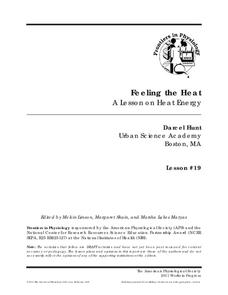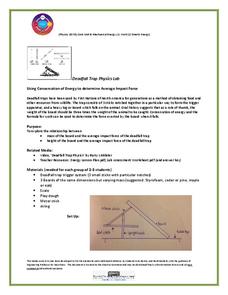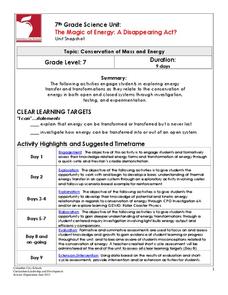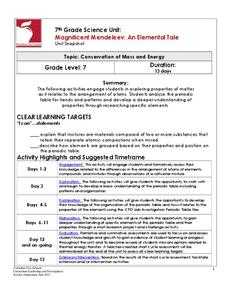American Chemical Society
Does Temperature Affect Dissolving?
When making sweet tea, why do people dissolve the sugar in hot tea instead of cold tea? The class discusses the previous lab and builds upon it. Working in groups, they design an experiment to determine how temperature affects the...
American Physiological Society
Why is Kettle Corn Cooked in Copper Pots?
The kitchen — it's not just for eating anymore! Specific heat is often a difficult concept to grasp, so give it context by relating it to cooking. Learners gain experience in the principles of thermal energy transfer by designing an...
American Physiological Society
Feeling the Heat
How do the changing seasons affect the homes where we live? This question is at the forefront of engineering and design projects. Challenge your physical science class to step into the role of an architect to build a model home capable...
Smithsonian Institution
Weather Widget
What's so difficult about predicting the weather? Scholars work collaboratively to build a device that models how meteorologists use computers to forecast weather. Team members collect and interpret data while working together to...
Michigan Technological University
Giant Mirrors
Did you know some retailers use curved mirrors in their fitting rooms to make customers look thinner? Pupils view themselves in convex and concave mirrors to understand the difference. The resource includes big ideas for multiple age...
Institute of Electrical and Electronics Engineers
Smart Buildings and the Internet of Things
Is your building a smart building? Pupils learn what makes a building smart and about the internet of things. After viewing several videos on the topic, they conduct an activity collecting data from sensors and brainstorm ways to improve...
Columbus City Schools
Planet X
How did the earth become the mass that it is now? Your young scientists explore this question through the concept of density. Their inquiries consider the impact of gravity on the formation of planets. The culminating activity of the...
Kenan Fellows
Evaluating Sensors and the Impacts of Physiological Stress: Designing a Wearable Device for Rescue Workers
A long-term project has scholars consider ways in which sensors help monitor physiological stress levels of rescue workers. They design and create a portable device for this purpose. Techies to the rescue!
Smithsonian Institution
Trait Tracker
Help mice beat the odds with an exciting activity about traits. Biologists discover the role of diet and other factors on animal traits by participating in a simulation activity. Teams collect and evaluate data to understand how certain...
Curated OER
Nuclear Chemistry Project
Radiation has numerous real-world applications, some of which are relatively safe while others can be extremely hazardous. In this nuclear chemistry project, young scientists choose a practical use of nuclear reactions to research in...
University of Saskatchewan
Using Conservation of Energy to Determine Average Impact Force
Explore the center of gravity with your science class as they create a deadfall trap with common materials. They research the concepts of energy conservation and gravitational force before dividing into small groups to create a model of...
Columbus City Schools
The Magic of Energy: A Disappearing Act?
Using the 5E method for teaching about kinetic energy, potential energy, and conservation of energy, this two-week unit with many videos and possible extensions is sure to keep pupils engaged as they are learning.
Rochester Institute of Technology
Artificial Hearing
Your sense of hearing depends upon tiny hairs deep inside your ear and if you lose these hairs, you lose your hearing. Here, groups explore hearing through the decibel measurement of common sounds. As a class, participants discuss...
Rochester Institute of Technology
Laparoscopic Surgery
Nobody is as smart as all of us together. In a collaborative learning activity, scholars learn it takes a team to be successful in laparoscopic surgeries. Groups complete the laparoscopic task as a team and discuss their results to...
US Department of Agriculture
Sink or Float?
Will it sink or will it float? Learners predict the outcome as they drop random objects into a container of water. Then, they keep track of the results and record the data in a t-chart to draw a final conclusion.
Columbus City Schools
Magnificent Mendeleev: An Elemental Tale
Discover how the periodic table tells the story of its elements. Learners begin by studying the makeup of several mixtures. Their analysis leads to a discussion of elements and the periodic table. As they dig deeper, they understand the...
Columbus City Schools
Diversity of Living Things
Here's a topic classes can really dig—the fossil record. Use the well-organized and thoughtful road map to take eighth graders back in time to unearth the answer. Learn how our climate has changed, and how organisms have changed along...
Beyond Benign
Green"er" Precipitation Reaction
All sodium carbonate may not have the same amount of carbonate, but it should have the same percent. Learners write and balance an equation to predict the chemical reaction between sodium carbonate and zinc acetate. Through the lab...
Royal Society of Chemistry
Chemistry Masterclass—Chemistry Outreach
Immerse your chemistry class in the world of organic chemistry! Science scholars isolate acetaminophen from an over-the-counter sample during an intense and interesting lab. Groups use many different separation and analysis techniques to...
Royal Society of Chemistry
Organic Molecules Day—Chemistry Outreach
In search of an organic lab that employs real-life techniques and analysis methods? Groups carry out the nitration of methyl benzoate, then attempt to determine the number and location of the nitro groups added to the benzene ring....
American Physiological Society
An Inquiry into Alcoholic Fermentation
Introduce life science students to their new "best buds" yeast! Using a wide variety of materials, lab groups design an experiment that illustrates how yeast acquires the resources it needs to undergo cellular respiration. The teacher's...
Rustle Leaf
Tell Someone About Earth Day
Celebrate Earth Day by spreading the word of conservation. Teach children ten easy ways to help preserve the Earth and share this knowledge with others by sending e-cards and printable cards to loved ones. Extend learning about the...
Michigan Sea Grant
Water Quality
Learners observe water samples and measure the samples' water quality. Students develop their own criteria for measuring water quality and test for temperature, acidity, oxygen levels, turbidity, conductance, sediment and hardness.
Institute of Electrical and Electronics Engineers
Design and Build A Better Candy Bag
Young scholars discuss how the final design for a product can affect its success. They work together to design and develop a better candy bad. They predict the volume and strength they need for the bag to be successful.
Other popular searches
- Lesson Planning Template
- Lesson Planning Tips Esl
- English Lesson Planning
- Unit Lesson Planning
- Ethnicity Lesson Planning
- Lesson Planning Guide
- Preschool Lesson Planning
- Daily Lesson Planning
- Lesson Planning for Library
- Lesson Planning Rating=3
- Event Planning Lesson Plans
- Unit Lesson Planning Ponds

























